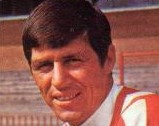Related Research Articles

The Texaco Cup, officially known as the International League Board Competition, was an association football competition started in 1970, involving sides from England, Scotland, and Ireland that had not qualified for European competitions.

The Anglo-Scottish Cup was a tournament arranged for teams in the English and Scottish football leagues during the summer for several years during the 1970s. It was created in 1975 as a new incarnation of the Texaco Cup, with a similar format to its predecessor, but involving clubs from England and Scotland only.
Terence McDermott is an English former professional footballer who played as a midfielder. Nicknamed "Terry Mac", he is best known as a member of the Liverpool team of the 1970s and early 1980s, where he won three European Cups and five First Division titles. Either side of his time at Anfield, he played for Newcastle United, with his second stint seeing him reunite with former Liverpool teammate Kevin Keegan. Internationally, he was capped 25 times for England, and was part of the of UEFA Euro 1980 and the 1982 FIFA World Cup squads.
James Greenhoff is an English former footballer. He was a skilful forward but, although capped five times at under-23 level, he never played for the full side and is labelled as the finest English player never to play for England. He made nearly 600 appearances in league football. His younger brother Brian was also a professional footballer.
Michael Pejic is an English former professional footballer who played as a left-back in the English Football League for Stoke City, Everton and Aston Villa, also representing England.

David Vernon Watson is an English former professional footballer who played as a defender. During his club career, he played for Notts County, Rotherham United, Sunderland, Manchester City, Werder Bremen, Southampton, Stoke City, Vancouver Whitecaps and Derby County. Watson is regarded as one of Sunderland's greatest defenders of all time.

John Henry Ritchie was an English footballer. He is Stoke City's all-time record goalscorer.
Dennis Tueart is an English former footballer who played for Sunderland, Manchester City, Stoke City and Burnley at club level. On the international scene, he won six full caps for England.
Alan Bloor is an English former professional footballer and manager. He made 394 league appearances in the Football League for both Potteries teams.

Vivian Dennis Busby was an English professional footballer and manager. He played for Wycombe Wanderers, Luton Town, Newcastle United, Fulham, Norwich City, Stoke City, Sheffield United, Tulsa Roughnecks, Blackburn Rovers and York City.

Graham Charles Paddon was an English footballer who played as a midfielder for Coventry City, Millwall, Norwich City and West Ham United.
Colin Dobson was an English professional footballer who played as an inside-forward. He also had a long career in coaching and coached domestic and national teams in Arabia.
James Gillen Robertson is a Scottish former professional footballer who played as a winger for Cowdenbeath, St Mirren, Tottenham Hotspur, Arsenal, Ipswich Town, Stoke City, Seattle Sounders, Walsall and Crewe Alexandra. He was capped once for Scotland.
Peter Dobing is an English former footballer who played as an inside forward in the Football League for Blackburn Rovers, Manchester City and Stoke City.
William John Bentley is an English former professional footballer who played as a left-back. He made 439 league appearances in a 15-year career in the Football League.
Geoffrey Salmons is an English former footballer who played for Chesterfield, Leicester City, Sheffield United and Stoke City as a midfielder.
Thomas Cassidy was a Northern Ireland international footballer who played as a midfielder.
The 1970–71 season was the 72nd completed season of The Football League.
Stewart Jump is an English former footballer in the Football League for Crystal Palace, Fulham and Stoke City. He also had a successful career playing in the United States, and was chosen as the MVP of the 1975 Soccer Bowl.
References
- 1 2 3 4 5 6 7 Matthews, Tony (1994). The Encyclopaedia of Stoke City. Lion Press. ISBN 0-9524151-0-0.
- ↑ "JOHN TUDOR". neilbrown.newcastlefans.com. Retrieved 14 March 2023.
- ↑ John Tudor at the English National Football Archive (subscription required)
- ↑ Vernon, Leslie; Rollin, Jack (1977). Rothmans Football Yearbook 1977–78. London: Brickfield Publications Ltd. p. 491. ISBN 0354 09018 6.